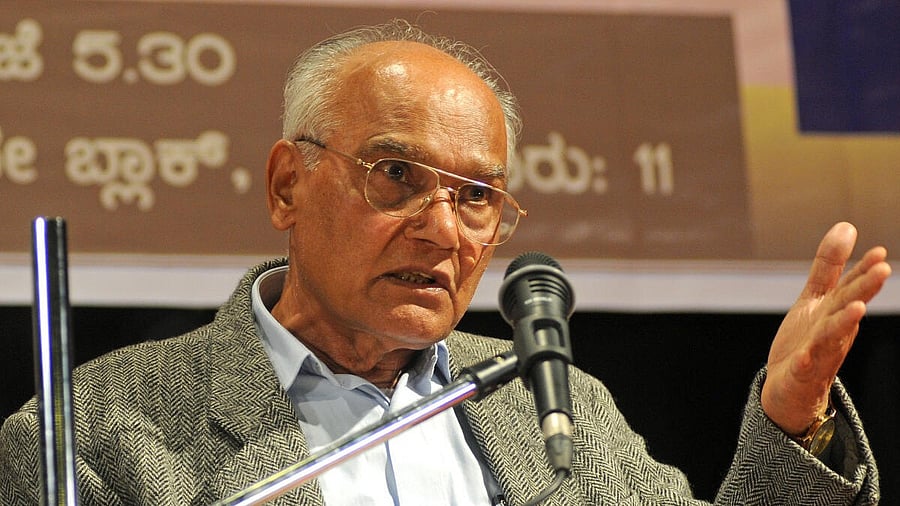
S L Bhyrappa.
Credit: DH Photo
S L Bhyrappa’s death on Wednesday marks the end of an era in Kannada literature. He was one of the most prolific and widely read, debated and translated writers in India.
Bhyrappa had extensive knowledge of Eastern and Western philosophies, and his novels are deeply rooted in Indian, and more specifically Hindu, philosophy.
His range of topics is nothing short of amazing, and novels bear evidence to his copious reading and extensive travel.
His novels, such as Parva, Vamshavruksha, and Grihabhanga, are bestsellers in many Indian languages, and he enjoys a large following of educated, middle class readers.
Bhyrappa was already a big name in Kannada literature by the time he started teaching philosophy at the Regional College of English in Mysuru in 1972 (till 1991). Some of his students say his classes were dry, though he had plenty to give. But if students met him in his room, he was happy to speak about the research he was involved in for one of his most ambitious novels, ‘Parva’ (1979).
He was more than happy to share his findings, and show photographs of the site of the Kurukshetra war. He believed that the Mahabharata was about a war between two dominant tribes. His understanding of sociology and history made for fascinating narratives. He told his students, for example, that Draupadi belonged to a polyandrous tribe, and could therefore have five husbands.
I tried reading some of his novels as an immature, high school girl, and the long debates and philosophical exhortations in them left me unimpressed. But I liked ‘Parva’ for its rational, sociological approach to the epic.
Speaking about his autobiographical novel, ‘Grihabhanga’, Bhyrappa would recall his difficult childhood in a backward village. He is at his best when he lets his characters live their lives, as he does in ‘Grihabhanga’, rather than engage in philosophical debates.
Acting in the television serial ‘Grihabhanga’ directed by Girish Kasaravalli, has been one of my most memorable experiences. I was chosen to play a major role in it because, in real life, I spoke the dialect of Bhyrappa’s character.
When he saw the first few episodes, he was impressed and said the character was exactly as he had imagined it. I couldn’t have asked for a greater compliment.
Sometime in 2005-06, I had decided to translate the novel ‘Grihabhanga’ into English. When I gave a sample to Bhyrappa and sought his permission, he was gracious enough to say, ‘Go ahead. Don’t worry about its publication or the money. I will pay you for it because that novel has brought me a lot of money and recognition’.
‘Mixed feelings’
I gave up translating the novel after reading Aavarana, with its anti-Muslim rhetoric, and the discussions that followed in the wake of its publication.
Though I have mixed feelings about his works, I have no doubt that he was a towering figure in Kannada literature.
(The author is a well-known theatre and television artiste, translator and retired professor of English)